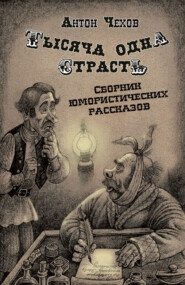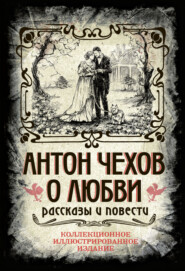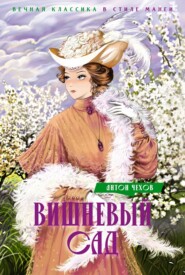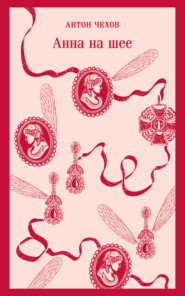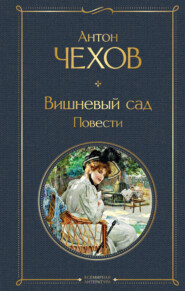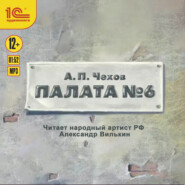По всем вопросам обращайтесь на: info@litportal.ru
(©) 2003-2025.
✖
The House with the Mezzanine and Other Stories
Настройки чтения
Размер шрифта
Высота строк
Поля
"Understand me, Anna," he whispered quickly. "I implore you to understand…"
She looked at him fearfully, in entreaty, with love in her eyes, gazing fixedly to gather up in her memory every one of his features.
"I suffer so!" she went on, not listening to him. "All the time, I thought only of you. I lived with thoughts of you… And I wanted to forget, to forget, but why, why did you come?"
A little above them, on the landing, two schoolboys stood and smoked and looked down at them, but Gomov did not care. He drew her to him and began to kiss her cheeks, her hands.
"What are you doing? What are you doing?" she said in terror, thrusting him away… "We were both mad. Go away to-night. You must go away at once… I implore you, by everything you hold sacred, I implore you… The people are coming – "
Some one passed them on the stairs.
"You must go away," Anna Sergueyevna went on in a whisper. "Do you hear, Dimitri Dimitrich? I'll come to you in Moscow. I never was happy. Now I am unhappy and I shall never, never be happy, never! Don't make me suffer even more! I swear, I'll come to Moscow. And now let us part. My dear, dearest darling, let us part!"
She pressed his hand and began to go quickly down-stairs, all the while looking back at him, and in her eyes plainly showed that she was most unhappy. Gomov stood for a while, listened, then, when all was quiet he found his coat and left the theatre.
IV
And Anna Sergueyevna began to come to him in Moscow. Once every two or three months she would leave S., telling her husband that she was going to consult a specialist in women's diseases. Her husband half believed and half disbelieved her. At Moscow she would stay at the "Slaviansky Bazaar" and send a message at once to Gomov. He would come to her, and nobody in Moscow knew.
Once as he was going to her as usual one winter morning – he had not received her message the night before – he had his daughter with him, for he was taking her to school which was on the way. Great wet flakes of snow were falling.
"Three degrees above freezing," he said, "and still the snow is falling. But the warmth is only on the surface of the earth. In the upper strata of the atmosphere there is quite a different temperature."
"Yes, papa. Why is there no thunder in winter?"
He explained this too, and as he spoke he thought of his assignation, and that not a living soul knew of it, or ever would know. He had two lives; one obvious, which every one could see and know, if they were sufficiently interested, a life full of conventional truth and conventional fraud, exactly like the lives of his friends and acquaintances; and another, which moved underground. And by a strange conspiracy of circumstances, everything that was to him important, interesting, vital, everything that enabled him to be sincere and denied self-deception and was the very core of his being, must dwell hidden away from others, and everything that made him false, a mere shape in which he hid himself in order to conceal the truth, as for instance his work in the bank, arguments at the club, his favourite gibe about women, going to parties with his wife – all this was open. And, judging others by himself, he did not believe the things he saw, and assumed that everybody else also had his real vital life passing under a veil of mystery as under the cover of the night. Every man's intimate existence is kept mysterious, and perhaps, in part, because of that civilised people are so nervously anxious that a personal secret should be respected.
When he had left his daughter at school, Gomov went to the "Slaviansky Bazaar." He took off his fur coat down-stairs, went up and knocked quietly at the door. Anna Sergueyevna, wearing his favourite grey dress, tired by the journey, had been expecting him to come all night. She was pale, and looked at him without a smile, and flung herself on his breast as soon as he entered. Their kiss was long and lingering as though they had not seen each other for a couple of years.
"Well, how are you getting on down there?" he asked. "What is your news?"
"Wait. I'll tell you presently… I cannot."
She could not speak, for she was weeping. She turned her face from him and dried her eyes.
"Well, let her cry a bit… I'll wait," he thought, and sat down.
Then he rang and ordered tea, and then, as he drank it, she stood and gazed out of the window… She was weeping in distress, in the bitter knowledge that their life had fallen out so sadly; only seeing each other in secret, hiding themselves away like thieves! Was not their life crushed?
"Don't cry… Don't cry," he said.
It was clear to him that their love was yet far from its end, which there was no seeing. Anna Sergueyevna was more and more passionately attached to him; she adored him and it was inconceivable that he should tell her that their love must some day end; she would not believe it.
He came up to her and patted her shoulder fondly and at that moment he saw himself in the mirror.
His hair was already going grey. And it seemed strange to him that in the last few years he should have got so old and ugly. Her shoulders were warm and trembled to his touch. He was suddenly filled with pity for her life, still so warm and beautiful, but probably beginning to fade and wither, like his own. Why should she love him so much? He always seemed to women not what he really was, and they loved in him, not himself, but the creature of their imagination, the thing they hankered for in life, and when they had discovered their mistake, still they loved him. And not one of them was happy with him. Time passed; he met women and was friends with them, went further and parted, but never once did he love; there was everything but love.
And now at last when his hair was grey he had fallen in love, real love – for the first time in his life.
Anna Sergueyevna and he loved one another, like dear kindred, like husband and wife, like devoted friends; it seemed to them that Fate had destined them for one another, and it was inconceivable that he should have a wife, she a husband; they were like two birds of passage, a male and a female, which had been caught and forced to live in separate cages. They had forgiven each other all the past of which they were ashamed; they forgave everything in the present, and they felt that their love had changed both of them.
Formerly, when he felt a melancholy compunction, he used to comfort himself with all kinds of arguments, just as they happened to cross his mind, but now he was far removed from any such ideas; he was filled with a profound pity, and he desired to be tender and sincere…
"Don't cry, my darling," he said. "You have cried enough… Now let us talk and see if we can't find some way out."
Then they talked it all over, and tried to discover some means of avoiding the necessity for concealment and deception, and the torment of living in different towns, and of not seeing each other for a long time. How could they shake off these intolerable fetters?
"How? How?" he asked, holding his head in his hands. "How?"
And it seemed that but a little while and the solution would be found and there would begin a lovely new life; and to both of them it was clear that the end was still very far off, and that their hardest and most difficult period was only just beginning.
GOUSSIEV
IT was already dark and would soon be night.
Goussiev, a private on long leave, raised himself a little in his hammock and said in a whisper:
"Can you hear me, Pavel Ivanich? A soldier at Souchan told me that their boat ran into an enormous fish and knocked a hole in her bottom."
The man of condition unknown whom he addressed, and whom everybody in the hospital-ship called Pavel Ivanich, was silent, as if he had not heard.
And once more there was silence… The wind whistled through the rigging, the screw buzzed, the waves came washing, the hammocks squeaked, but to all these sounds their ears were long since accustomed and it seemed as though everything were wrapped in sleep and silence. It was very oppressive. The three patients – two soldiers and a sailor – who had played cards all day were now asleep and tossing to and fro.
The vessel began to shake. The hammock under Goussiev slowly heaved up and down, as though it were breathing – one, two, three… Something crashed on the floor and began to tinkle: the jug must have fallen down.
"The wind has broken loose…" said Goussiev, listening attentively.
This time Pavel Ivanich coughed and answered irritably:
"You spoke just now of a ship colliding with a large fish, and now you talk of the wind breaking loose… Is the wind a dog to break loose?"
"That's what people say."
"Then people are as ignorant as you… But what do they not say? You should keep a head on your shoulders and think. Silly idiot!"
Pavel Ivanich was subject to seasickness. When the ship rolled he would get very cross, and the least trifle would upset him, though Goussiev could never see anything to be cross about. What was there unusual in his story about the fish or in his saying that the wind had broken loose? Suppose the fish were as big as a mountain and its back were as hard as a sturgeon's, and suppose that at the end of the wood there were huge stone walls with the snarling winds chained up to them… If they do not break loose, why then do they rage over the sea as though they were possessed, and rush about like dogs? If they are not chained, what happens to them when it is calm?
Goussiev thought for a long time of a fish as big as a mountain, and of thick rusty chains; then he got tired of that and began to think of his native place whither he was returning after five years' service in the Far East. He saw with his mind's eye the great pond covered with snow… On one side of the pond was a brick-built pottery, with a tall chimney belching clouds of black smoke, and on the other side was the village… From the yard of the fifth house from the corner came his brother Alency in a sledge; behind him sat his little son Vanka in large felt boots, and his daughter Akulka, also in felt boots. Alency is tipsy, Vanka laughs, and Akulka's face is hidden – she is well wrapped up.
"The children will catch cold …" thought Goussiev. "God grant them," he whispered, "a pure right mind that they may honour their parents and be better than their father and mother…"
"The boots want soling," cried the sick sailor in a deep voice. "Aye, aye."
The thread of Goussiev's thoughts was broken, and instead of the pond, suddenly – without rhyme or reason – he saw a large bull's head without eyes, and the horse and sledge did not move on, but went round and round in a black mist. But still he was glad he had seen his dear ones. He gasped for joy, and his limbs tingled and his fingers throbbed.
"God suffered me to see them!" he muttered, and opened his eyes and looked round in the darkness for water.
He drank, then lay down again, and once more the sledge skimmed along, and he saw the bull's head without eyes, black smoke, clouds of it. And so on till dawn.






